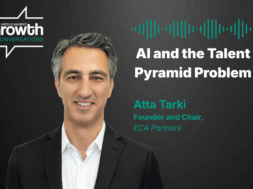Q&A: Why Permanent Equity Open-Sourced Its Due Diligence Process
Why Permanent Equity is sharing its due diligence strategy to other dealmakers

Last September, private equity firm Permanent Equity announced its “Do Diligence Confidently” project, an initiative that unlocks the firm’s due diligence process to other dealmakers. By sharing the firm’s own due diligence expertise through podcasts, an interactive PDF guide and various other online tools, Permanent Equity is allowing all stakeholders in an M&A transaction a window into this crucial step to closing a deal.
But for some firms, due diligence and other M&A processes are closely-guarded recipes to the secret sauce of dealmaking. Middle Market Growth sat down with Permanent Equity Managing Director Emily Holdman to learn more about why the firm is open-sourcing its due diligence process and what’s next for the initiative.
Middle Market Growth: Why did Permanent Equity decide to open-source its due diligence process? Isn’t that giving away your secret sauce?
Emily Holdman: Honestly, we’ve always thought it’s weird that diligence lists are hidden. The point of these questions is to facilitate productive information exchange. Sellers need time to prepare, and it benefits everyone when they’re able to prepare well. Unless someone is trying to hide or manipulate something, it seems like an area on which buyers, sellers, operators, and advisors should collaborate.
We strive to avoid sellers and advisors encountering any surprises or unknowns about the way Permanent Equity operates, in diligence or after close. Diligence is a significant amount of work for everyone. Sellers should be as equipped as buyers to enter into that step of deal-making confidently.
Diligence, for Permanent Equity as a buyer, is about confirming the details about who you are, what you do, and other things we need to know in order to be good stewards of the business post-close. That confirmation happens through exchange and discussion, which also begins to foster relationships with the operating team. Without a productive diligence period, we can’t close a deal. And if we’ve committed the resources to enter into diligence, we want to close.
Diligence is a significant amount of work for everyone. Sellers should be as equipped as buyers to enter into that step of deal-making confidently.
MMG: Who is the Do Diligence Confidently initiative for?
EH: We intentionally drafted this content to be approachable for a first-time seller, but thorough enough to be useful to buyers and advisors regularly involved in deal activity. One of the things that came up during this process is how our own checklist was in need of de-jargoning. We had a filter: If a company’s VP of Ops is asked to prepare responses to these questions, what first impression are those questions giving him/her of us? For many non-owner operators, diligence is that first impression of a prospective partner.
The published components of our diligence toolkit are a direct reflection of where we start in preparing to diligence an opportunity. It provides frameworks on staffing the diligence team, an overview of the process, and a 181-question checklist with examples of types of documentation that represent a complete response. In practice, we tailor our question list and process to each situation, as any thoughtful buyer will. But for any party, the toolkit provides a baseline from which to build.
MMG: What are some of the things that parties to an M&A deal get wrong in due diligence, and how does this guide address them?
EH: In general, too many good deal matches get rocky in diligence. For most sellers, it’s their first time going through the process, and they can be skeptical about why certain things are being requested. After all, many have heard stories about deals gone wrong. But a buyer may interpret reluctance and defensiveness negatively. So, we wanted to equip sellers to know exactly what we will ask and why, what example responses look like, and what elements they can control in the process.
The ways parties “get it wrong” are most noticeable in impact on communication, the timeline, and, ultimately, relationships. To give specific seller-related examples:
- Under-resourced Team: Understandably, many sellers want to limit the number of people involved in diligence. However, without appropriate resources, communication and progress can stall in ways that are detrimental to the deal.
- Partial Responses: Many sellers spend 2 to 6 weeks preparing responses to a question list and consider it complete, only to have to provide more thorough documentation later for 50% or more of their answers.
- Underappreciating Control: Many sellers only go through a deal once, and therefore retain advisors to help guide them. But in the end, advisors are not a direct party to a deal. The seller needs to know how to be a strong quarterback of their own deal, and great advisors empower them to do so.
To give specific buyer-related examples:
- Poor Guidelines: Buyers do deals regularly. It is our responsibility to help a seller know what to expect. Regarding the partial responses issue above, a poorly phrased question, or one without clear expectations, is often the ultimate culprit.
- Material Concerns: There is no perfect business. Question lists, meeting time, and general concern should be on material matters. A buyer that doesn’t align their team’s efforts accordingly will likely frustrate a seller, waste resources, and may kill a deal in the end.
MMG: What do you hope is achieved by sharing Permanent Equity’s due diligence process—both for the deal community and for your firm?
EH: It’s pretty simple: more productive deal-making. Selfishly, we want to do deals where even sellers retiring after the transaction are evangelists for us post-close; we want them to enjoy and appreciate the process. And, for the broader deal community, we think the poor reputation of the industry is partially tied to poor diligence communication, organization, and outcomes. Thoughtful, transparent diligence processes are helpful to everyone.
MMG: What has the reception been since you went live with Do Diligence Confidently in September?
EH: We are very pleased with the toolkit’s reception. That section of PermanentEquity.com has a steady stream of visitors, and we hope that continues.
The most common feedback is that it is empowering owners and non-owner operators to feel equipped to prepare for and confident that they can close a future deal.
MMG: What’s next? Are all the materials out there, or will this be something you add to?
EH: We have more in the works to provide greater transparency and guidance about the deal-making process in general. Since diligence is the middle part of deal-making, we’ve got plenty of clarifying work to do on both sides.
And we intend to regularly update the diligence checklist as we learn and improve.
Middle Market Growth is produced by the Association for Corporate Growth. To learn more about the organization and how to become a member, visit www.acg.org.


